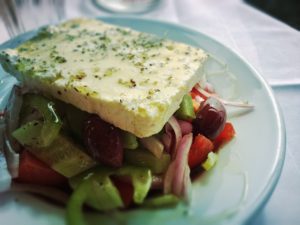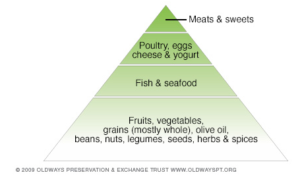The Merits of Going Mediterranean
Low fat… Vegan… Gluten-free… Anti-inflammatory… High protein… Paleolithic… Carb-free… Ketogenic… ?
Knowing what diet is best suited for your lifestyle and health goals is not easy, especially with so many options and “qualified” opinions available online. In this blog post I will break down one of the most well researched, attainable and sustainable diets available in the medical research. The mediterranean diet, which is touted for it’s benefits on human longevity and disease prevention, should be considered a way of living rather than a list of strict dietary recommendations. I find this diet is very easy for people to follow, is satisfying, and has great long term sustainability. “Diet” and “Long term sustainability” often aren’t used in the same sentence, but because the mediterranean diet ensures satiety and is easy to follow, long term sustainability is not a problem and in fact it sets this diet apart from other diets you may have tried in the past.
Why the Mediterranean diet?
 In a JAMA’s (the Journal of the American Medical AssociatIon) 10 year cohort study on participants from 10 European nations who typically eat a “Mediterranean diet” it was found that following a mediterranean diet dramatically reduced death by any cause, as well as death from cardiovascular disease, coronary artery disease, and cancer (1). New research from May 2016 has also shown that following a mediterranean diet significantly reduces hip fractures risk in postmenopausal women (2).
In a JAMA’s (the Journal of the American Medical AssociatIon) 10 year cohort study on participants from 10 European nations who typically eat a “Mediterranean diet” it was found that following a mediterranean diet dramatically reduced death by any cause, as well as death from cardiovascular disease, coronary artery disease, and cancer (1). New research from May 2016 has also shown that following a mediterranean diet significantly reduces hip fractures risk in postmenopausal women (2).
Additionally, the three lifestyle factors confer greater benefit when in conjunction with a mediterranean diet. These factors are independently and mutually beneficial in reducing death from all causes, cardiovascular diseases and cancer (1). The factors are:
- Being a non-smoker (For at least 15 years prior)
- Moderate to high physical activity level
- Moderate alcohol consumption (Read my lifestyle recommendations below for more information on alcohol)
The Mediterranean “Diet”
- As a foundation, fresh fruits, vegetables, whole grains, nuts, seeds, beans, legumes and oils make up the majority of the diet. Vegetarian meals are common and encouraged.
- Olive oil and canola oil are used in place of butter and other saturated fats (Coconut oil). When cooking at high heat avocado oil is recommended.
- You may think that eating more nuts and vegetable oils (healthy fats) will make you gain weight, but a recent study from July 2016 specifically showed that following a mediterranean diet did not cause weight gain nor increases in central abdominal fat, whereas eating a carbohydrate-rich diet did (3)!
- Fish and seafood are the second most abundant food group. Cold water fatty fish are preferred, eg. trout, salmon, mackerel, pickerel, sardines, tuna.
- Two concerns I have with fish intake are heavy metal content and quality of fish. Heavy metals accumulate in larger fish like salmon and tuna, so eating a lot of these fish varieties can be problematic. Try subbing for smaller fish like sardines, pickerel, mackerel or anchovies which don’t bioaccumulate metals to the same degree as the larger fish. Secondly, always try to eat a wild caught fish, or sustainably farmed fish, as these populations are naturally higher in heart healthy omega 3 fatty acids. The studies I have read did not discriminate between large fish and small fish, but rather, only emphasized their omega 3 content.
- Next is chicken, eggs, yoghurt and cheese. Suggested intake is 2-3 times per week.
- Lastly and least, meats and sugary sweets are limited to 1-2 times per week

Lifestyle Considerations
- Adding a moderate amount of red wine per day (5oz for women, 10oz for men) is common and has been shown to have cardiovascular health benefits. This is suggested for healthy patients without history of substance abuse or liver conditions.
- Getting plenty of exercise and leading an active lifestyle every day (gardening, cleaning, walking, household activities)
- Eating meals in a calm, relaxed, and social environment with family and friends
- Skip your after dinner snack. New weight loss research has come out about limiting food intake to meal time, and allowing our bodies to enter a truly “fasted” state overnight. This allows the body to burn stored glycogen and eventually fat stores as a fuel source. I believe this research is congruent with a mediterranean diet, as dinner would be the final meal of the day and a meal enjoyed by the family. After dinner the kitchen is closed!
8 Tips to Switch From Your “SAD” (Standard American Diet) to the Mediterranean Diet
- Introduce “Meatless Mondays” and change your family’s expectations for meat at every meal every day. Collaborate with your family to try a new vegetarian recipe every week.
- Skip the bacon – add avocado to your breakfast for a savoury and satisfying healthy fat option
- Substitute store bought salad dressings with olive oil, vinaigrette and fresh chopped herbs and seeds. Nutrient dense and free of additives!
- Get nutty – stocking up on walnuts, pecans, almonds, cashews and brazil nuts provides the resources for a savoury snack on the go, as well as heart healthy fats. Choose a small handful of unsalted nuts for a snack in the afternoon.
- Substitute fish or seafood for meat twice a week. Baked, roasted or barbequed fish is best.
- Try a new vegetable once a month. Adding a new vegetable once a month creates nutrient diversity and gets you eating more vegetables.
- Switch to whole grains. If you’re still eating white bleached flour products we need to talk. Seriously!
- Swap your whole fat milk and cheese products for lighter versions, or milk alternative options. Typically the mediterranean diet says to switch to non-fat versions, but I prefer patients to eliminate cow’s dairy altogether, and if necessary switch to goat milk products which are known to be less allergenic even for children with cow’s milk allergy (4).
Dr. Kristin Spark, BSc, B.Nat, CISSN, Naturopathic Doctor sees patients at: Verdure Wellness Clinic in Uptown Waterloo. For information about appointments, or to book your appointment, click here
The content provided is not intended as health or medical advice, diagnosis, treatment or a prescription. Always seek the advice of your medical provider with any questions you have regarding medical conditions. Dr. Kristin Spark, Naturopathic Doctor is released from any liabilities resulting from the use of information contained here.
Resources:
- Kim T. B. Knoops, MSc; Lisette C. P. G. M. de Groot, PhD; Daan Kromhout, PhD; et al. JAMA. 2004;292(12):1433-1439. doi:10.1001/jama.292.12.1433
- Bernhard Haring, MD, MPH1; Carolyn J. Crandall, MD, MS2; Chunyuan Wu, MS3; et al. JAMA Intern Med. 2016;176(5):645-652. doi:10.1001/jamainternmed.2016.0482
- Estruch R et al. Lancet Diabetes Endocrinol. doi:10.1016/S2213-8587(16)30085-7 [published online June 6, 2016])
- Y.W. Park. Small Ruminant Research. 14(2), August 1994, Pages 151-159.


 At the root of preventative healthcare, is education. Let me help you stay informed to find your highest health potential. Information provided on this website is for educational and promotional purposes only, and does not serve as, or replace, medical recommendations, treatments or prescriptions.
At the root of preventative healthcare, is education. Let me help you stay informed to find your highest health potential. Information provided on this website is for educational and promotional purposes only, and does not serve as, or replace, medical recommendations, treatments or prescriptions.